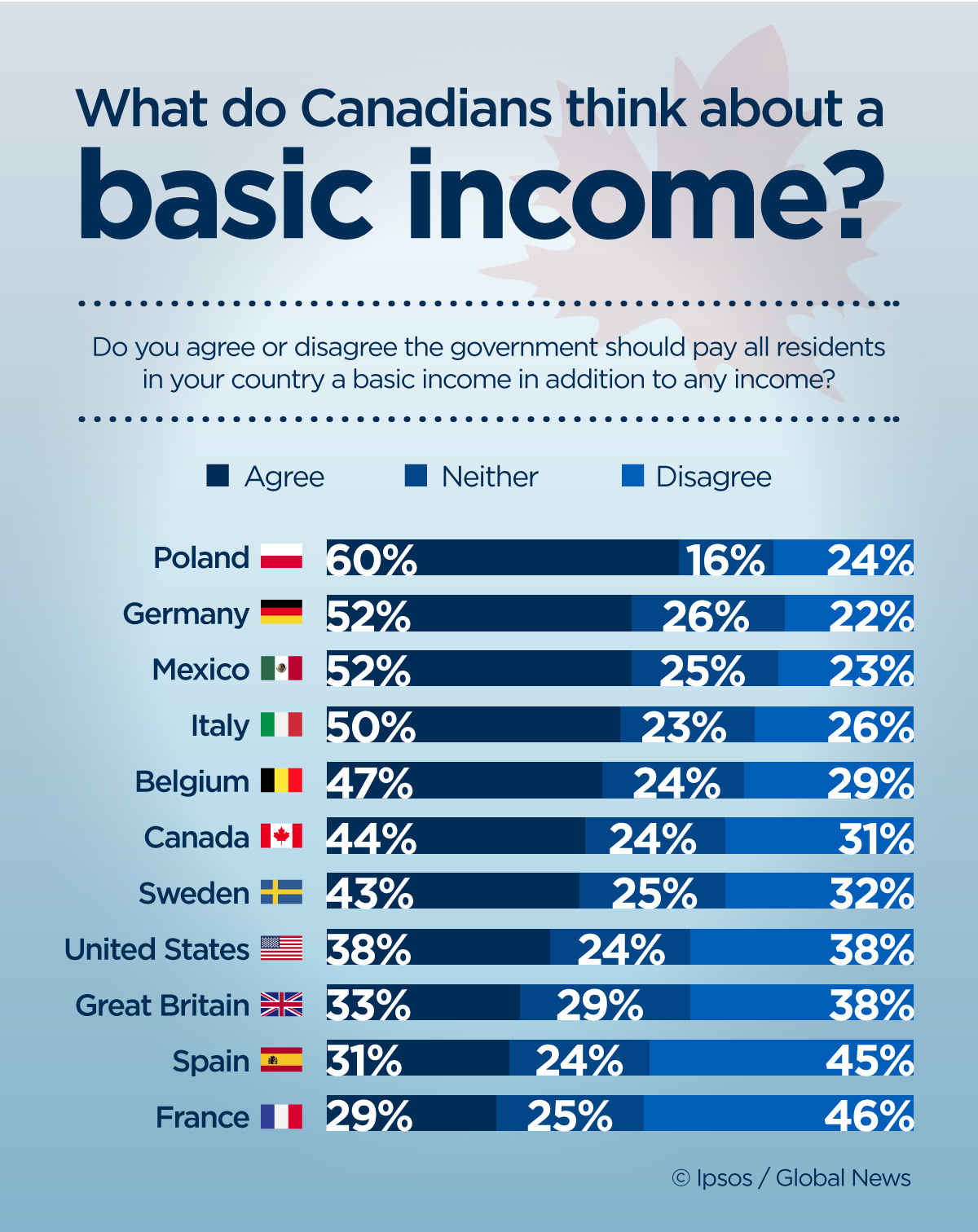Ontario is testing it, candidates from all political parties have suggested it, and it’s endorsed by Elon Musk: the idea of a guaranteed basic income (GBI).

Across Canada, and around the world, the idea of giving residents unconditional monthly payments — also known as a guaranteed annual income or guaranteed minimum income — to cover basic living costs has been hotly debated by people on all sides of the political aisle.
READ MORE: What you need to know about Ontario’s basic income plan
A new poll conducted by Ipsos Affairs shows that Canadian attitudes are tepid when it comes to the idea of a basic income with 44 per cent of respondents saying they agree with a GBI. Thirty-one per cent disagreed with the idea and 24 per cent were neutral.
The survey of nearly 10,000 people from 12 countries showed that respondents from Poland, Germany, Mexico and Italy were most likely to agree with the idea of government providing unconditional money to supplement incomes.
WATCH: Basic income debate in Canada
Residents from France and Spain were more likely to disagree with the idea, while Great Britain, the U.S. were more divided on the issue.
In April, the Ontario government announced roughly 4,000 residents in three cities — Hamilton, Lindsay and Thunder Bay — will be provided with a free income of up to $16,989 per year per person. Couples could get up $24,027.
Ontario will join other jurisdictions around the world, including Finland, the Netherlands and California, in testing the idea of a basic income.
Proponents of the idea say it would more effectively combat poverty or the plight of people working minimum wage jobs, while also cutting bureaucratic red tape. The idea is to replace various social and welfare payments with a basic income that has no employment conditions or means tests.
Opponents, however, say it disincentives people to work while also being costly to implement.
- What is a halal mortgage? How interest-free home financing works in Canada
- Ontario doctors offer solutions to help address shortage of family physicians
- Capital gains changes are ‘really fair,’ Freeland says, as doctors cry foul
- LGBTQ2 rallies will be held across Canada next month. Here’s what to know
READ MORE: How would a guaranteed annual income work in Canada
The new polling data showed 61 per cent of Canadians believe a GBI would help alleviate poverty, one of the strongest majorities, along with Poland, among the 12 countries surveyed. Germany (59%), U.S. (56%), Belgium (54%) and Mexico (53%) finished near the top.
“The economy is shifting and there is a lot of income volatility, a lot of people who even if they are well educated are living on the edge,” Colledge said. “People see the need for something like this, but how it gets applied and whether it can be done is a long ways from having solidified in the public’s mind.”
READ MORE: The problem(s) with a guaranteed annual income
Indeed, 60 per cent of respondents in Canada said a GBI would discourage people from seeking employment, while 15 per cent disagreed and 25 per cent said neither. Fifty-two per cent of Canadians also said a basic income would “increase taxation to unaffordable levels,” with 16 per cent disagreeing and 31 per cent agreeing.
Would a guaranteed income cause people to work less?
Researchers at the Mowat Centre, a think tank with the University of Toronto, looked at previous experiments in Canada and the United States and found that a basic income causes people to “work differently, not necessarily less.”
“Among married women receiving a basic income, for example, annual hours worked decreased by as much as 28 per cent,” the report said. “For married men, the reduction was as high as 8 per cent. On the other hand, the Manitoba experiment revealed reductions as small as 3 per cent and 1 per cent.”
Evelyn Forget, an author of the Mowat report and professor of community health sciences and economics at the University of Manitoba, has studied the issue extensively. She is credited with discovering and studying forgotten data on a basic income experiment in Dauphin, Man., in the 1970s, known as Mincome.
READ MORE: Work woes, evolving technology behind push for basic income
Forget also released another study in May with the Northern Policy Institute looking at the cost of implementing a basic income program, similar to Ontario’s pilot program, across Canada.
The report found it would cost Canadians approximately “$30 billion a year, less the $15 billion we currently pay for income assistance.”
“A net cost of $15 billion annually is not only feasible, it is about five per cent of federal government expenditure and much less than we currently spend on seniors’ benefits,” Forget wrote. “We can afford it if we choose to afford it.”
The Global @dvisor survey was conducted between April 21 – May 5 comprising 9,500 interviews in 12 countries: Belgium, Canada, France, Germany, Great Britain, Italy, Mexico, Poland, Serbia, Spain, Sweden, and the United States of America. The survey was conducted online among adults aged 18-64 in the US and Canada, and adults aged 16-64 in all other countries.
Approximately 1000+ individuals were surveyed online in Canada, France, Germany, Great Britain. Italy, Spain, and the United States of America. Approximately 500+ individuals were surveyed in Belgium, Mexico, Poland, Serbia, and Sweden. The results are weighted to ensure that the sample’s composition reflects that of the adult population according to the most recent country Census data, and to provide results intended to approximate the sample universe. Further, results are weighted to give each country an equal weight in the “global” sample.












Comments